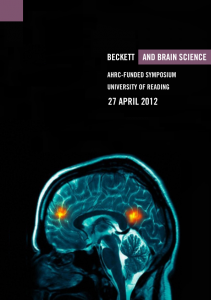Beckett and Brain Science (2012)
Samuel Beckett has long been read as a writer who asks questions of the locus of the human, and the relationship between literature and society’s deepest sense of itself. This project, funded by an AHRC Science and Culture Exploratory Award, extended this tradition into a new arena, using Beckett’s work as a test case to ask specific questions of the relationship between literature, theatre and the scientific and medical understanding of the mind. It explored the interconnections between neurological and psychiatric conceptions of language, embodiment and the self in the work of Samuel Beckett.

Much of Beckett’s work is vitally concerned with consciousness and the phenomenology of perception and experience, making it a rich field of investigation in connection with psychiatric disorders, and with brain science in general. The aim of this project was to produce collaborative partnerships between literary and theatrical scholars and clinicians and researchers in psychiatry and neuroscience, using the work of Samuel Beckett to interrogate current concepts of mental disorder. Workshops involving scholars and practitioners in the arts and sciences contributed to current debate about the human side of medicine, and gave an intellectual framework to the intuition of many clinicians that literature offers a means of understanding challenging mental and neurological conditions. Dialogue with these clinical experts also offered those in the humanities new ways of conceptualising and describing the human.
Workshops
The project comprised three workshops exploring how the study of Beckett's writing and theatre might enhance the understanding of clinical and conceptual categories of mental experience.
University of Reading
The first workshop was held at the University of Reading on 27th April 2012. The aim of this event was to utilise the empirical resources available in the University's Beckett Collection (the world’s largest collection of materials related to Beckett) to better understand Beckett’s knowledge of psychiatry, neurology, and psychoanalysis, and to explore how this knowledge and interest informed his work. Leading experts on Beckett, including his biographer and friend James Knowlson, offered insights into the writer's psychological concerns, while other modernist scholars, such as Ronald Schleifer, reflected on the important relationships between modernism and medicine, which frame this project.
University of London, Birkbeck
The second workshop was held at Birkbeck College, University of London on 22nd June 2012. This event built on the first workshop to produce a series of ‘shared texts’ and consider the theoretical questions needed for bringing Beckett studies and brain science together. Catherine Malabou and Lois Oppenheim gave keynote addresses, and clinicians and scholars from various backgrounds and fields came together to respond to Beckett's texts from the perspective of their subject area.
University of Warwick
The final workshop took place at the University of Warwick on 18th September 2012. During the event, delegates heard from psychiatrists and doctors about how they use Beckett’s work in teaching and to reflect on their own clinical understanding and practice. The workshop explored the potential for producing new kinds of scientific knowledge through performance. Experts in the fields of psychiatry, neurology, philosophy and theatre reflected upon the challenges to medical classifications produced by experiential approaches to the study and treatment of the mind.
Team
This project was led by Dr Ulrika Maude (formerly University of Reading; now University of Bristol), Dr Elizabeth Barry (University of Warwick), and Dr Laura Salisbury (formerly Birkbeck, University of London; now University of Exeter).
More information
For more information about this project, including recordings of papers delivered at the workshops, can be found here.
